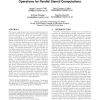Free Online Productivity Tools
i2Speak
i2Symbol
i2OCR
iTex2Img
iWeb2Print
iWeb2Shot
i2Type
iPdf2Split
iPdf2Merge
i2Bopomofo
i2Arabic
i2Style
i2Image
i2PDF
iLatex2Rtf
Sci2ools
651
click to vote
PVM
2015
Springer
2015
Springer
Isomorphic, Sparse MPI-like Collective Communication Operations for Parallel Stencil Computations
We propose a specification and discuss implementations of collective operations for parallel stencil-like computations that are not supported well by the current MPI 3.1 neighborhood collectives. In our isomorphic, sparse collectives all processes partaking in the communication operation use similar neighborhoods of processes with which to exchange data. Our interface assumes the p processes to be arranged in a d-dimensional torus (mesh) over which neighborhoods are specified per process by identical lists of relative coordinates. This extends significantly on the functionality for Cartesian communicators, and is a much lighter mechanism than distributed graph topologies. It allows for fast, local computation of communication schedules, and can be used in more dynamic contexts than current MPI functionality. We sketch three algorithms for neighborhoods with s source and target neighbors, namely a) a direct algorithm taking s communication rounds, b) a message-combining algorithm th...
| Added | 16 Apr 2016 |
| Updated | 16 Apr 2016 |
| Type | Journal |
| Year | 2015 |
| Where | PVM |
Comments (0)

